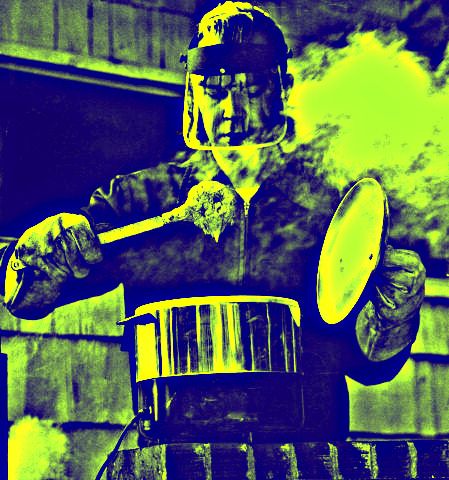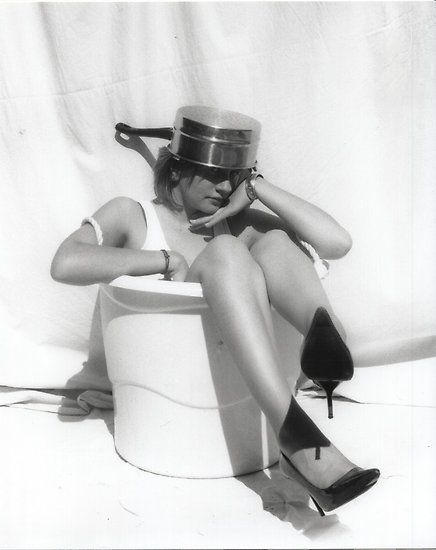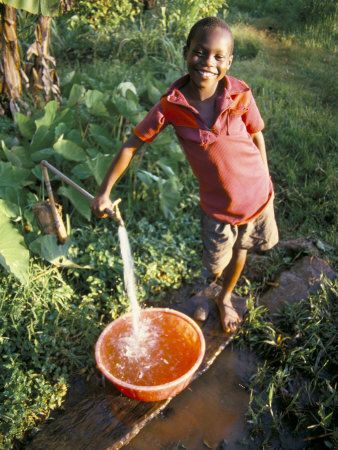 To answer your immediate question... yes, I'm completely serious. It is, indeed, very simple to boil water. Put water in pot, put pot on stove, turn on burner, and wait. That's about it. But there is a right way and a wrong way to do even this simplest of kitchen tasks... and, knowing you, you're probably doing it wrong.
To answer your immediate question... yes, I'm completely serious. It is, indeed, very simple to boil water. Put water in pot, put pot on stove, turn on burner, and wait. That's about it. But there is a right way and a wrong way to do even this simplest of kitchen tasks... and, knowing you, you're probably doing it wrong.I'm not going to bore you with the science fair explanation of how water boils. I'm not your third grade science teacher. If you haven't figured out basic fucking physical science by now, you're beyond hope and should just go lay in traffic. This is simply a look at some of the common misconceptions about boiling water, as well as the rules you SHOULD be following when you put a pot on to boil.
 Salt
SaltSalt should only be added to boiling water if you're looking to season whatever it is you plan on cooking in the water. Practically speaking, salt doesn't cause water to boil faster: if you were working with pure water, adding salt would lower the boiling point by one degree for every ounce you add, but since we're dealing with tap water, it makes no difference. That being said, if you're boiling something that you don't want to infuse with salt, don't add the salt.
Oil
Proving that you can never know everything, adding oil to water when boiling pasta is commonly though to help keep the noodles from sticking together. Turns out... not so much. The oil just sits on the top of the water, and when you drain your pasta, it gets coated in the oil, making it more resistant to your sauce. So, no more oil when you boil pasta. If you want to keep your pasta from sticking together, stir it several times during the first few minutes.
Water
Any water from a household tap that you intend to consume should come from the tap cold. When you turn on your hot water tap, the water that you're getting has been sitting around inside your pipes and water heater, where it can easily have picked up impurities and bacteria. On top of that, water tends to get stale when it sits. So, any water you boil or freeze should come from the tap cold. If a recipe calls for hot water, run cold water and warm it up. This makes a noticeable difference.
Pot
Any pot you intend to boil water in should be capable of handling at least twice as much water as you put in it. Not only does this help heat circulate, but it ensures that you won't have to worry about boiling over and burning your tiny, feminine hands. While you CAN boil water in an uncovered pot, it takes significantly longer, so use a fucking lid.
Temperature
Once water begins to boil (that is, bubbles form at the bottom near the heat source and travel to the top and out) it will not continue to raise in temperature. Boiling water stays at 212° F no matter what. All of the additional heat energy you're pumping into the pot is transferred to the act of boiling (the state change from liquid to gas), meaning you get more bubbles more frequently. For cooking purposes, we're obviously most concerned with temperature so, ideally, we want to keep the water at a lower boiling rate to retain more of it.
 Always start with your heat at the highest setting to get your water up to 212° faster. On the highest setting, the average stove reaches around 650°, far more than you need to keep water boiling. Once you reach a boil, always lower your temperature to medium or below. Your water is still just as hot as if your stove top was set on high, you're just not losing as much water. A quicker boil doesn't cook your food any faster. It can, however, break up delicate foods.
Always start with your heat at the highest setting to get your water up to 212° faster. On the highest setting, the average stove reaches around 650°, far more than you need to keep water boiling. Once you reach a boil, always lower your temperature to medium or below. Your water is still just as hot as if your stove top was set on high, you're just not losing as much water. A quicker boil doesn't cook your food any faster. It can, however, break up delicate foods.You now know everything you need to know about boiling water but were too ignorant to ask. Never fucking question me again.



Should be noted that air pressure and humidity levels can affect the temperature at which water boils. Normally not an issue in our local, but can be a determining factor in higher altitudes that water boils at a much lower temp so the food has to be cooked longer to ensure fully cooked, where as with a pressure cooker, you can force water to boil at a much higher temperature, thus not disturbing delicate food, but also impedes the taste testing and stirring process.
ReplyDeletePut a lid on your pot to make it boil faster.
ReplyDelete